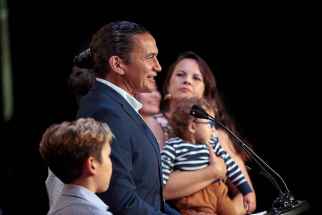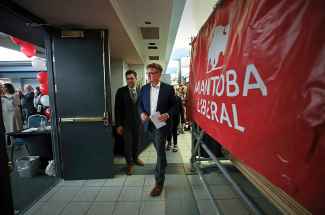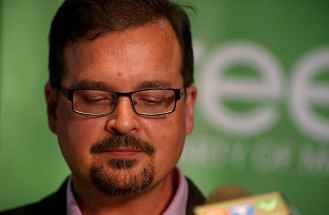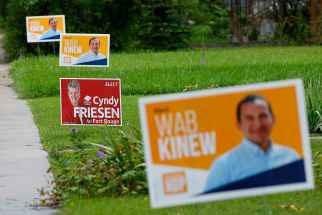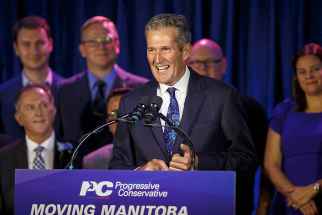Pallister prevails Premier wagers on early vote, wins another big majority
Read this article for free:
or
Already have an account? Log in here »
To continue reading, please subscribe:
Monthly Digital Subscription
$0 for the first 4 weeks*
- Enjoy unlimited reading on winnipegfreepress.com
- Read the E-Edition, our digital replica newspaper
- Access News Break, our award-winning app
- Play interactive puzzles
*No charge for 4 weeks then price increases to the regular rate of $19.00 plus GST every four weeks. Offer available to new and qualified returning subscribers only. Cancel any time.
Monthly Digital Subscription
$4.75/week*
- Enjoy unlimited reading on winnipegfreepress.com
- Read the E-Edition, our digital replica newspaper
- Access News Break, our award-winning app
- Play interactive puzzles
*Billed as $19 plus GST every four weeks. Cancel any time.
To continue reading, please subscribe:
Add Free Press access to your Brandon Sun subscription for only an additional
$1 for the first 4 weeks*
*Your next subscription payment will increase by $1.00 and you will be charged $16.99 plus GST for four weeks. After four weeks, your payment will increase to $23.99 plus GST every four weeks.
Read unlimited articles for free today:
or
Already have an account? Log in here »
Hey there, time traveller!
This article was published 10/09/2019 (2289 days ago), so information in it may no longer be current.
Brian Pallister’s gamble of an early election paid off for the Progressive Conservative party, which won a second, albeit slightly smaller majority government Tuesday night.
The PCs lost only a handful of seats to the NDP in Winnipeg, although one, Colleen Mayer, was a member of Pallister’s cabinet.
The Tories swept the NDP out of power in 2016, taking 40 of 57 seats in a modern-day Manitoba record. They won 36 Tuesday.
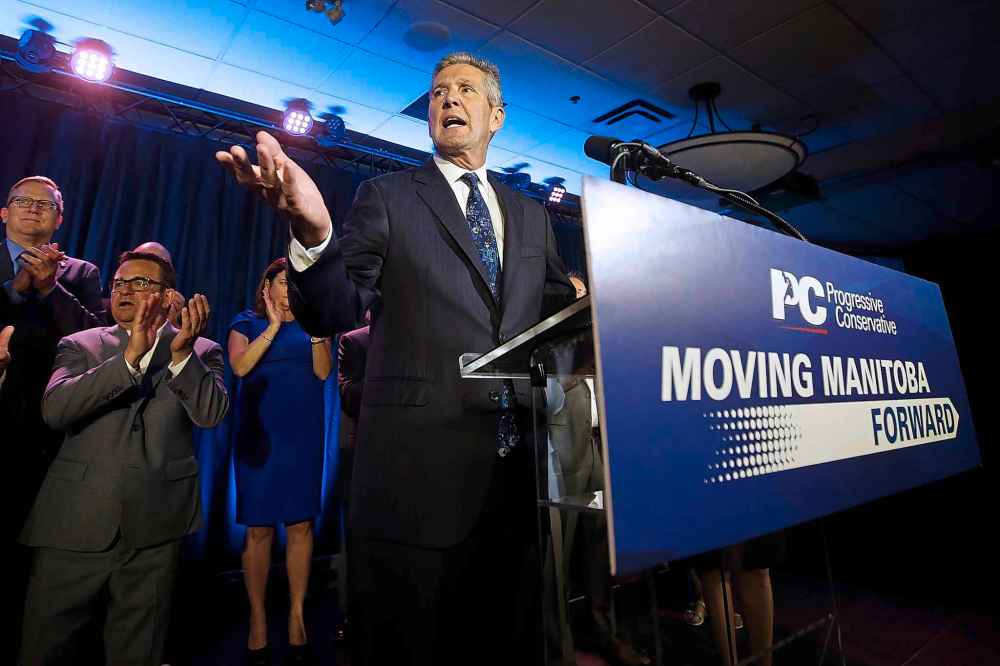
The New Democrats gained a modest four seats from their showing a little over three years ago, while the Liberals finished with three, a loss of one from when the election was called.
At PC headquarters last night, a happy crowd — although not as jubilant as in 2016 — repeatedly chanted “four more years” as Pallister and his wife Esther walked into the room.
Pallister said the victory was historic.
“We captured, over the last two elections, more seats than any back-to-back government in the history of the Province of Manitoba. That is a monumental honour and it carries with it a monumental responsibility,” he said.
Asked what message he took from the fact that the PCs lost seats, the premier said: “I think we need to listen better. I think we need to communicate better what we’re doing and why.”
While last night’s overall results maintained the status quo in the legislature, Manitoba’s 42nd general election produced a few breakthroughs.
Fewer Manitobans — about 50 per cent of eligible voters — cast ballots in Tuesday’s election, down significantly from the 57.4 per cent who participated in 2016. Half of the campaign was fought during the summer.
The makeup of the new legislature will be the most ethnically diverse ever after electing its first black MLAs.
Mayer, who served as Crown services minister, was gracious in defeat.
“I’m not hanging my head,” she said at her campaign headquarters. “We worked very hard here.”
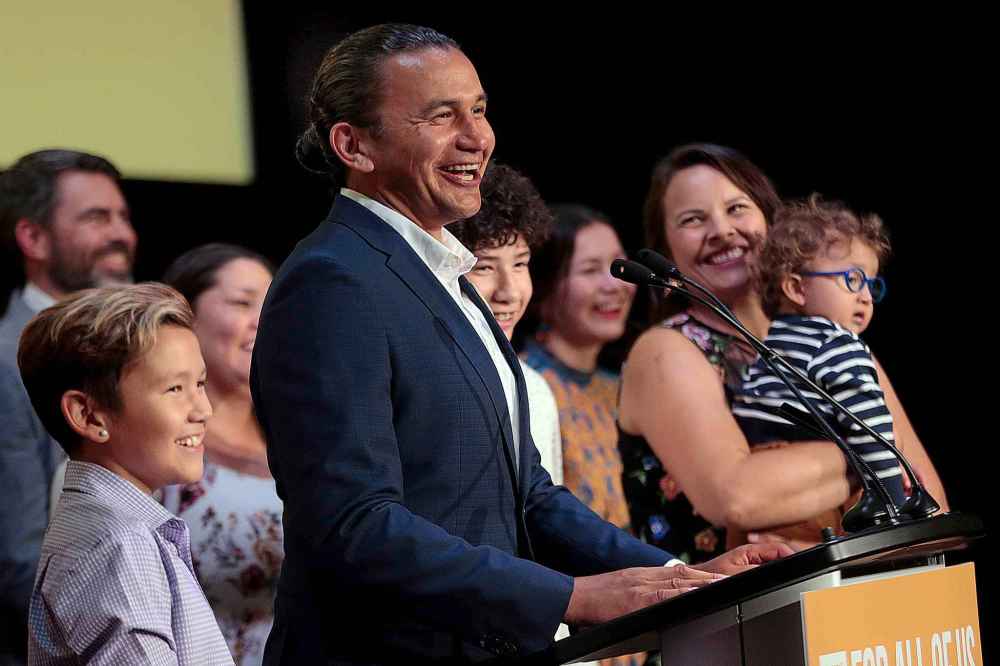
NDP Leader Wab Kinew, speaking to supporters, took consolation in the fact that his party made some gains in Winnipeg, electing several new members.
“I’m feeling pretty good tonight,” he said.
The Liberals, who won only three seats, will lose party status in the legislature and the additional funding that comes with it. All three incumbents who were seeking re-election won their seats, including party leader Dougald Lamont.
“We presented actual solutions… We ran a clean campaign and we didn’t sling mud. Maybe that was a huge mistake. Maybe next time we’re going to have to run on no ideas at all and insults,” Lamont told a downcast gathering of supporters.
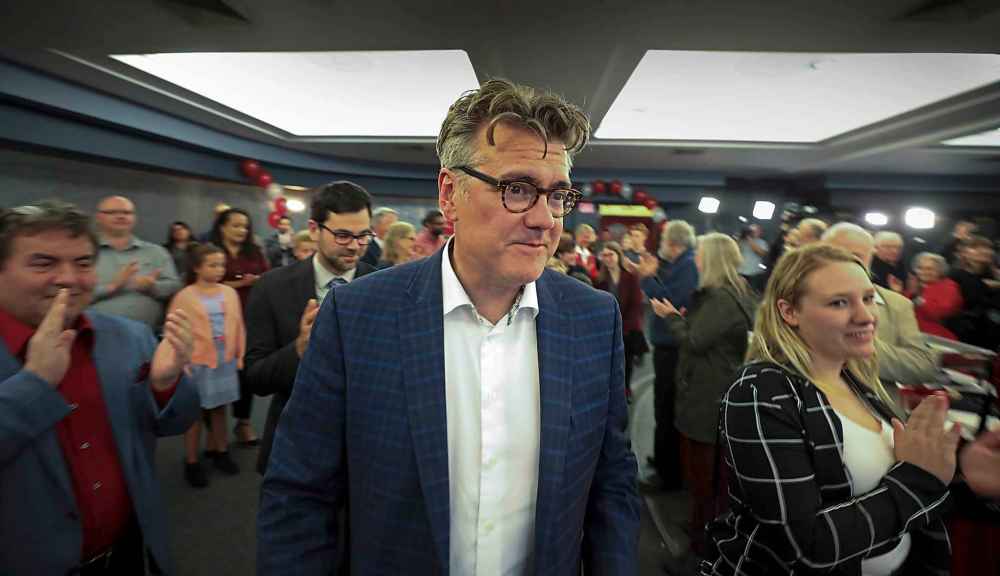
The Greens had high hopes that David Nickarz would make history by winning the party’s first seat in Manitoba in Wolseley. But Nickarz came up short, losing to the NDP’s Lisa Naylor, a Winnipeg School Division trustee.
In 2016, Nickarz raised hopes for the future by nearly unseating NDP incumbent Rob Altemeyer, who did not run for re-election.
Pallister set an ambitious agenda in his first three-plus years in office, slashing a government deficit that threatened to climb to $1 billion and overhauling Winnipeg’s hospital system. On July 1, he kept his promise to lower the provincial sales tax by a percentage point. Before calling the election, he also launched a review of the province’s education system.
While he has been widely criticized for his austerity agenda and his fights with other levels of government, Manitoba voters — particularly those living outside the Perimeter — were in no great mood for change.

The PCs sought to soothe concerns on the health-care file by promising to boost spending in that area by $2 billion over four years. They also promised to create 40,000 jobs and continue to lower taxes.
Late in the campaign, they held out an attractive carrot to homeowners, promising to begin phasing out the education portion of property tax bills once the province’s books were in the black.
After signalling his intention of an early election for several months, Pallister called the vote in early August. His reasoning for going early — the election had been set for Oct. 6, 2020 under the province’s fixed-date election law — is that he didn’t want the vote to interfere with Manitoba’s 150th birthday celebration next year.
Some speculated that he may have called the vote a year early to avoid campaigning during a sluggish economy or he was worried about continued resistance to some of his government’s controversial hospital reforms in Winnipeg.
Others saw the early election call as coinciding with the premier’s retirement plans. Pallister wanted to win a second term, complete his cherished goal of balancing the provincial budget and then retire sooner than if had served two full terms.
larry.kusch@freepress.mb.ca

Our newsroom depends on a growing audience of readers to power our journalism. If you are not a paid reader, please consider becoming a subscriber.
Our newsroom depends on its audience of readers to power our journalism. Thank you for your support.
History
Updated on Tuesday, September 10, 2019 11:07 PM CDT: Updates photo


